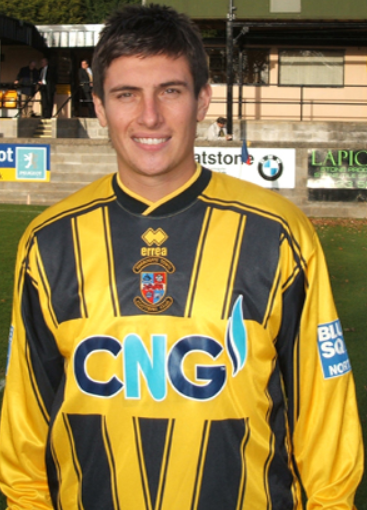 |
 |
 |
 |
 |
 |
 |
 |
 |
 |
 |
Players
Tony
Hackworth (striker) 1997-2001
Hackworth signed pro forms with Leeds on 1 August 1998 and was given
shirt number 26 in the first-team squad. He regularly featured for the
reserves, making substitute and starting appearances, and was rated for
his physical presence — standing around 6 ft 1in — and goal threat. Yet
breaking into a first team brimming with stars like Alan Smith, Harry
Kewell, and Mark Viduka proved beyond reach. His senior debut finally arrived during the 2000/01 campaign — not in
the Premier League but in the club’s UEFA Champions League campaign. On
13 September 2000 he made his first-team debut as a substitute at the
Camp Nou in a 4–0 loss to Barcelona, replacing Stephen McPhail in the
68th minute. Shortly afterwards, on 31 October, he made his only senior
appearance in domestic cup action: he came off the bench in a League Cup-tie
at Tranmere Rovers, only to be substituted himself later in the game. Hackworth's only other first-team experience came in March 2001, when
he featured as a substitute against Lazio at Elland Road in a dramatic
3–3 Champions League draw. That appearance marked his final involvement
at senior level for Leeds United. In total, he made just three first-team
appearances. Off the pitch, Hackworth’s Leeds tenure coincided with high-profile legal
controversy involving teammates Jonathon Woodgate and Lee Bowyer. Hackworth
himself was charged with violent offences in 2000 but was ultimately cleared
by Hull Crown Court in March 2001. According to witnesses, he appeared
to try to stop the altercation — he looked like actor Chris Klein to a
paramedic who spoke to him — and was formally discharged without conviction. Despite his promise at youth and reserve levels, a serious cruciate ligament
injury impeded his progress. In July 2001 Leeds accepted a Ł120,000 offer
from Notts County, and Hackworth left Elland Road after five years at
the club — with his first-team opportunities effectively behind him. At Notts County, from July 2001, Hackworth sought playing time but struggled
to make a sustained impact. Over three seasons he made 23 starts and numerous
substitute appearances, scoring just two goals — once in the Football
League Trophy against York City and once in the league against Bournemouth.
In total, he made 17 league starts and scored once, adding substitute
appearances across league and cups, but didn’t manage to establish himself
as a key figure. In March 2004 he joined Scarborough on loan before signing permanently
in the summer. At Scarborough he became a first-team regular, eventually
scoring 14 league goals in 75 appearances over two spells. He was released
in May 2006 but re-signed two months later and netted nine goals in 39
matches during the 2006/07 season, his most successful campaign as a senior
striker. When Scarborough FC folded in 2007, Hackworth moved into non-league football
with Whitby Town, where he quickly became a regular. In November 2007
he joined Harrogate Town in the Conference North, debuting against Alfreton
Town and making an impact before returning to Whitby Town as vice-captain.
Across these stints, he scored crucial goals and provided leadership before
eventually joining Scarborough Athletic in 2011 as captain — scoring twice
on his debut in their opening match in August 2011. Over the course of his non-league career, he scored 37 goals in 123 starts
(plus four as a substitute) for Whitby in one spell, and captained Scarborough
Athletic as they rebirthed from the ashes of the old club. He retained
his involvement in football throughout, both as a player and later taking
coaching roles and teaching at Pindar School in Scarborough. Looking back at his Leeds United phase, Hackworth’s journey reflects
the narrow margins for academy-born strikers. Despite shining in the youth
and reserve set-ups — including scoring in reserve friendlies such as
versus Oldham — he never appeared in the Premier League and only featured
in cup and European substitute roles. Competing with future internationals
limited his pathway, while injuries and off-field distractions further
derailed progress. He remains emblematic of many promising young English
forwards at Leeds around the turn of the millennium: talented, professional,
but ultimately unable to bridge the gap to the top level. Tony
Hackworth was born on 19 May 1980 in Durham, England, and rose through
the ranks at Leeds United amid one of the most celebrated eras in the
club’s history. Joining the club as a trainee in 1996, he quickly became
a prolific scorer in the youth system, helping Leeds’ under-19 side to
league and FA Youth Cup success in 1997, though he missed the final through
injury. He appeared for the England Under-18 team in a 1-2 defeat in Moscow
on 26 October 1997 in the UEFA Tournament, on 30 May 1998 against Cyprus
and 1st June against France, both at Clamcey, one as a substitute.
Tony
Hackworth was born on 19 May 1980 in Durham, England, and rose through
the ranks at Leeds United amid one of the most celebrated eras in the
club’s history. Joining the club as a trainee in 1996, he quickly became
a prolific scorer in the youth system, helping Leeds’ under-19 side to
league and FA Youth Cup success in 1997, though he missed the final through
injury. He appeared for the England Under-18 team in a 1-2 defeat in Moscow
on 26 October 1997 in the UEFA Tournament, on 30 May 1998 against Cyprus
and 1st June against France, both at Clamcey, one as a substitute.